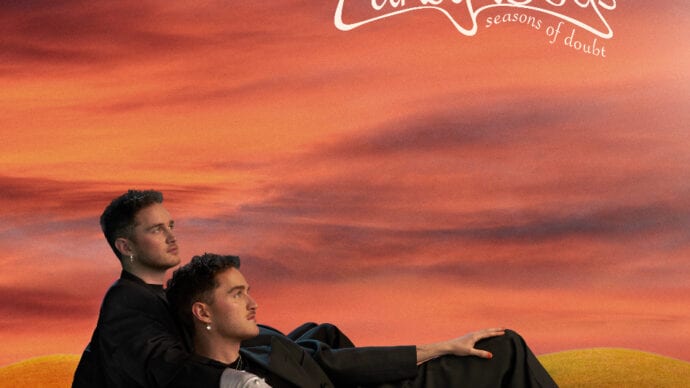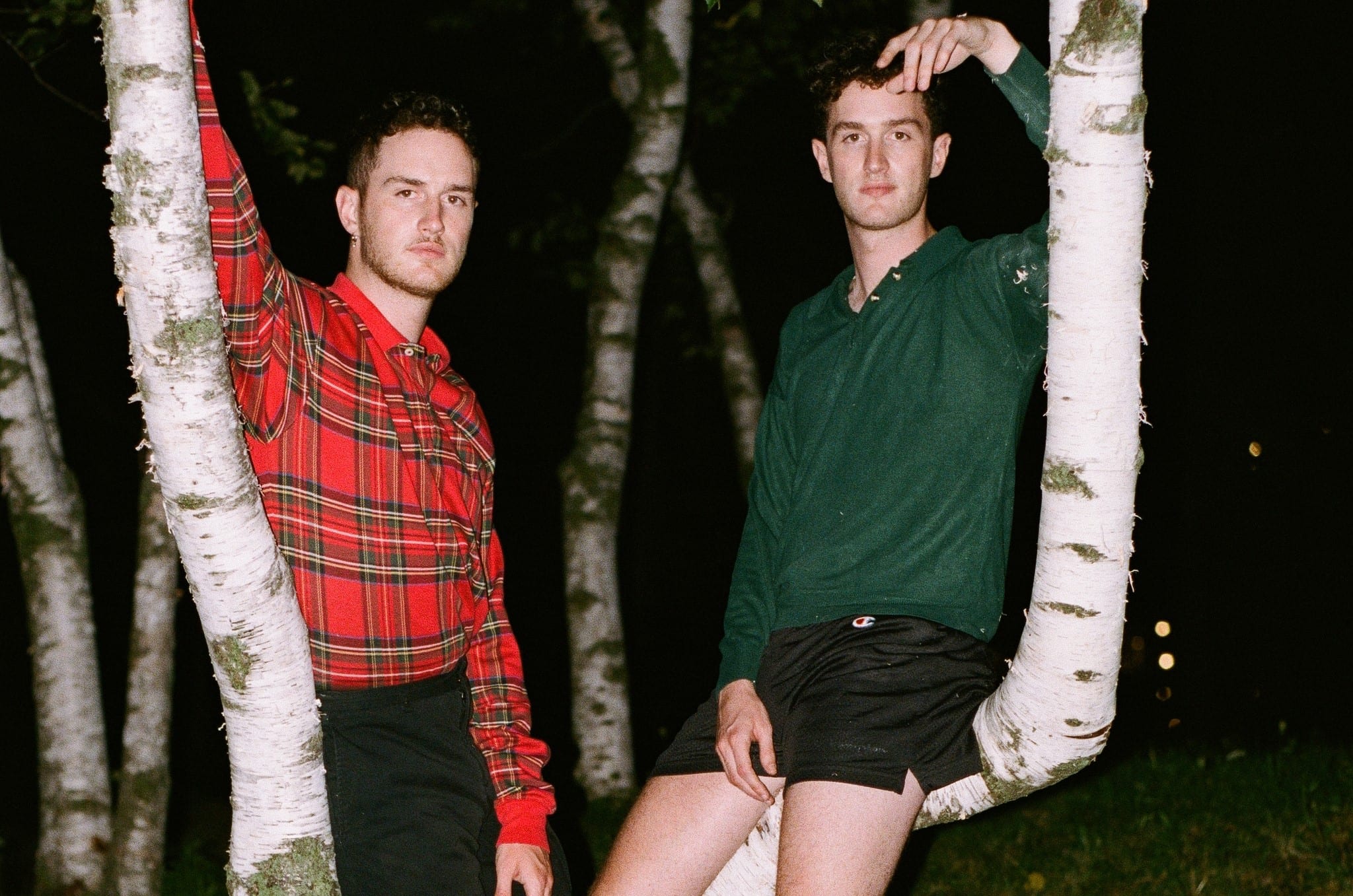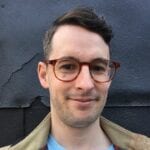As queer twin brothers, Pansy Boys’ Joel and Kyle Curry feel their minds connected by an “invisible wire.” Growing up in Stittsville, a small suburban community in Ottawa that boasts Kathleen Edwards’ coffee shop as its main claim to fame, the siblings have always been forced to create their own culture. The goal of their music, they say, is to “add a drop of beauty into the world.”

That beauty brims over on the Toronto-based duo’s new EP, Seasons of Doubt, which combines tightly hemmed vocal harmonies with an airy, wistful orchestral-pop sound. Drawing on influences including Arthur Russell, Caroline Polachek and Blood Orange, their ambitions are as grand as their swirling piano melodies. The soft-focus electronic backdrop of the seven-song EP is accented with pulsing beats and sweeping cellos from guest musician Eliza Niemi. While previous Pansy Boys releases have aimed to reflect a range of perspectives outside of their own, this EP gazes inwards, tracing their first real experiences with romantic relationships. The flurry of feelings in Seasons of Doubt may have begun pulling them apart, but at the end of the day, they remain inseparable.
I saw you just celebrated your 25th birthdays this week. Happy birthday, and congrats on your new EP!
Kyle: Thanks! It’s been a big week for us. A good way to roll into our quarter-life crisis.
What has it been like to share a birthday for all of these years? How do you usually celebrate?
Kyle: Well, we’re always together, obviously. For the past few years, since moving to Toronto, we’ve gone to the beach, drank some wine with friends and celebrated. It’s always by the water somewhere, whether we’re in the city or at a cottage.
Can you tell me a bit about Stittsville where you grew up? How small is it?
Kyle: It’s growing, to be honest. Our parents always say it’s getting too big and they have to get out of there. It’s a suburban small town on the outside of Ottawa with lots of bushes and trails. It’s very small-town vibes, and actually quite beautiful, but maybe just for a day. Then you have to get going.
Is there any kind of queer culture there or did you have to find it elsewhere?
Kyle: No, none. In high school, there was hardly anyone who was out at all. It’s a very heteronormative town, but these days it’s blossoming a bit. Kathleen Edwards runs a coffee shop there. It’s going to become the new Portland.
I watched a video interview filmed at your parents’ house. It looks pretty big!
Kyle: I guess that’s the classic suburban lifestyle. When we were growing up, we obviously weren’t the biggest fans of it and I would never move back. We learned to appreciate the isolation of suburbia as teenagers, though. It made us dream a bit more. Joel: Whenever I’m there I do a lot of songwriting. It’s basically all I can do. You have to stimulate yourself through your dreams with the queer aesthetic, because there’s not much going on there in that regard. That’s probably where we’re at our most creative, strangely enough.
I guess it can be kind of like an artist’s retreat.
Kyle: Exactly. There’s an upright piano there, which is a big part of our music, so having that really helps us create the inspiration for our songs.
People called you “pansy boys” when you lived there and that’s why you decided to reclaim the name, right?
Kyle: That’s one of the softer words people used! In university we were really having trouble picking a name because we didn’t want to be Joel and Kyle Curry. We were trying to think of something as lush as our music is, and a play on the kinds of words that are used to attack LGBTQ2 people.
How did moving to Montreal and studying musical theatre help inspire your music?
Joel: I think the city of Montreal is the best education we got for becoming Pansy Boys. Kyle: We were studying music theory and jazz, which is quite mathematical. We look at ourselves more as songwriters: We compose things, obviously, but we don’t usually get down deep into writing out parts on sheet music. It was good for our music, but it wasn’t as stimulating as going out to clubs and other fantastic queer events. That really shaped us, and made us comfortable to be queer, cis men. We were coming from suburbia where we didn’t see anything at all, so Montreal was an amazing rush of newness. The first gay club we went to was there when we were 18, and that was the beginning of the end [laughs]. People love to dance and no one’s really selling themselves, if that makes sense. Even if you are, you’re doing it out of love and creativity instead of networking.
How would you say your sound has evolved over the years to get to where you are on this new EP?
Joel: When we first started, we wanted to harness a timeless sound, which I think we accomplished. Over the past year or two, we’ve tried to bring in more of a modern realm, while maintaining that lushness. On this EP, we explored a bit more with soundscape-y sounds and synths, that kind of thing. The stuff we’ve been writing recently has even more of a pop element, which we love blending with sad songs.
“Someone in Grade 8 will have the slow dance of their dreams to our songs.”
Kyle: For Seasons of Doubt, I would say we added a lot more movement to the songs with rhythm and percussion. That is present in a lot of our work, but some songs are quite slow. On this EP, there are faster tracks like “Sunsets,” and even the first one, “Softer,” has a heavier movement. That was due to a lot of help from our producer, Jaiden-Davis Jones, who pushed us to go there. Pop music is one of our greatest loves. We’re not always as sad and down as our music is, so we wanted to make a hybrid of the two. It’s music you can look out the window and cry to, but also sway to in the breeze. Joel: Someone in Grade 8 will have the slow dance of their dreams to our songs [laughs].
I read a CBC article in which you mentioned different kinds of influences. Joel, you seem to like pop, while Kyle, you’re more into rock. Does that feel like a fair divide?
Kyle: Interesting! I would say I like more tacky pop music, whereas Joel… what do you mean when you say rock?
You mentioned The Replacements and The Smiths.
Joel: Truly, we share a very similar music taste. It’s also quite eclectic and not just pop or indie. I think we take from a bunch of different genres as influences, but of course The Replacements. We love them!
Do you have any current musical obsessions?
Joel: I’ve been really into listening to Arthur Russell’s more country-esque vibes, like Love Is Overtaking Me or Iowa Dreams. I have a picture of him hanging up in my room. Kyle: We do love Caroline Polachek. Her use of cinematic, intense sounds while also making it into a pop record is very inspiring, especially for what we’re aiming to do going forward. There’s also the way she’s meticulous with melody and visuals, because Pansy Boys are trying to elevate the visual. Everything she did for her album Pang is insane to me. I love it. Joel: Obviously the new Perfume Genius album is amazing. Rufus Wainwright has always been a big influence for us, too, alongside Dev Hynes’ work as Blood Orange.
Are you fans of Canada’s other queer musical twins, Tegan and Sara?
Joel: Oh my god. I honestly don’t listen to them enough. They’re obviously Canadian icons! One day I accidentally went to their website, so now whenever I go to Twitter on my phone it automatically types in “Te” and sends me to teganandsara.com [laughs].
As you’ve grown older, have you noticed any ways in which you’re the same and which you’re different?
Kyle: I think we’ve grown more together. We’ve got the same friend group, make our music together and we went to university together for the exact same thing. Our lives could truly not exist without each other. Joel: We always joke that we have this invisible wire between our brains. If ever one of us is further away and down in the dumps, we can feel the wire tug. Kyle: As far as differences, when you get older you get more comfortable within yourself. I’d say one of the challenges of being a twin—and being as close as we are—is that we don’t know true independence. We’ve never moved to a city by ourselves before, and I think that can be a damper, too, because it’s almost too much weight to put on the other person if that makes sense. For this EP, some of the songs are about a relationship Joel was in. That’s something we’ve learned to navigate through being adults. Being a twin of someone who’s in a relationship changes the bond. It’s weird seeing your twin go through the ebbs and flows of that. We are one person, but we’ve also become more independent in the way we live our lives.
What qualities make you two different?
Kyle: Joel wakes up every morning and does his bar class, while I’m in bed scrolling. Joel: Kyle is a bit more sassy, but in a good way. He’s the bolder twin who pushes me to do things, while I’m the gentle one who sometimes pulls him back down to earth. It’s a good mix. Kyle: That’s probably why we work so well together. We bring out the best and worst in each other, and can remind the other one when it’s time to tone things down. I’ll usually tell him if he wants to wear an outfit, he should just do it! Joel reacts to things more logically, whereas I react more emotionally. If we’re getting into a debate with someone, Joel’s good at having a laser vision of what we want to say, while I can go off on a Real Housewives rant.
You’ve talked in the past about how you want your lyrics to reflect a variety of different perspectives instead of just your own. But the songs on your new EP sound a bit more personal—what kinds of themes or topics connect them?
Kyle: I would say we went a bit more inwards on this EP and explored our own lives a bit more. It’s all about this in-between feeling and phase, where you know there’s the great fire inside you but it’s surrounded by a numbness that’s not allowing you to get there. It’s so close on the other side of this wall you’ve built up inside yourself. That’s what “seasons of doubt” truly are: Being doubtful in how you can love someone, or take in your love yourself. Joel: We have one lyric in the song “Showgirl Syndrome” that I really love. It says “Maybe I’ve worn myself out in the dance to just be.” I think that’s a good way to think about the EP: It’s almost like tiring yourself out to just feel something or have experiences. Kyle: It’s even just about the little things in life. We used to be a lot more vulnerable to everyday beauty, but somewhere down the line I found myself pulling harder and harder to feel that fluttering inside me. It’s this war with yourself to find peace of mind, but you can’t have a war and become peaceful.
What are the symptoms of “Showgirl Syndrome”?
Kyle: Our birthdays were two days ago, so we are Leos. Joel: Growing up in Stittsville as two queer twins, obviously people would say things and look at us a lot. It’s ingrained in us to feel different and that we’re always being watched. That goes along with the war with yourself, to always want more and become this great spectacle, instead of just enjoying being who I am at the end of the day. There’s a line that’s like: “I sing all my hopes for tomorrow / Not happy, not sad, but okay / I dance in the kitchen like a goddamn showgirl / And I give myself all the bouquets.” It’s about those times when I know I’m not thriving and I’m still in the season of doubt, but I’m going to put on a show even if it’s just for myself.
I see that reflected in your videos, too—you add an element of glamour or fantasy to fairly normal activities. Whether you’re filming with a VHS camera, a fish-eye lens or a soap opera soft focus, it seems like you’re trying to find beauty in mundanity.
Kyle: We always say our main goal with everything is to add a drop of beauty into the world. Even if it’s in a small dose, we want to do that with our music.
In your first email to me, you said: “We hope you enjoy this music as much as we do.” I thought that was cool because artists don’t always have that much confidence in or enjoyment of their work. Do you think it’s important to really love what you’re doing?
Kyle: It’s funny, because we love the process of songwriting and production, but once the music is out, we don’t really listen to it that much. Joel: The kind of music we make is a bit unique and special because there aren’t as many people taking that timeless route right now. It’s good there are all kinds of music, though. Artists should love what they make—or at least believe they do. Kyle: If I listen too much, I just start to hear all the things I wish I could have done differently. This EP has basically been finished since March, and we’ve just been waiting to put it out because obviously the world is chaotic. I hadn’t listened to a single song until we started doing promos again. It’s not for us anymore; it’s for listeners now. Joel: An artist we really like named Aldous Harding did an interview where she said, “It’s not the songs that change, it’s the listener.” The first time you listen to something you might love it, but then two weeks later the song will change with your own perception. I think that’s important to remember as an artist. Kyle: Our poor producer Jaiden probably had to listen to every song a billion times. By the time we were done, I could see his ears bleeding. Sorry we’re so meticulous!
I was happy to see Eliza Niemi playing cello on your new EP, too.
Kyle: Yes, our queen! She’s so brilliant, and we listen to her solo music every day. I feel very lucky to have her on the EP because she’s so busy and always working on a billion projects.
What’s next for Pansy Boys?
Kyle: When COVID-19 started, we naturally felt a little lull in creativity. Now we probably have six or seven songs written that we need to record, but we want to challenge ourselves with the kind of world we’d like to put that music into. Production-wise and instrument-wise, we’d like to take it to a bit of a grander level, and maybe more poppy. Joel: There might be more beats and less of a moody sound. We’d like it to be something you can listen to in the park with friends, because that’s where we are—socially distanced of course—every weekend. It’s a big part of our lives, and nice to have music that complements that kind of thing. We’re not going to pop out bangers, but maybe melancholy pop.


 Why you can trust Xtra
Why you can trust Xtra


